Dan Riley's Blog, page 15
July 26, 2018
Mexico on a Whim & a Prayer
 Mexico to US border crossing, San YsidroI’ve become a maniac about our new electric bikes, the wonders of which will be the subject of another blog post some time in the future. Yesterday, I was looking for a bit of a change from our local and quite splendid bike path and thought I’d beat the heat by taking the bike down to Coronado Island and riding the path there that hugs the shoreline and goes the length of the island. But just before turning off the I-5 to cross the Coronado Bay Bridge, I experienced a very rare submission to impulse. I saw a sign that said I was 15 minutes from the Mexican border and decided to take it. We’ve lived just a bit more than an hour from that border crossing for 20 years, and I’ve never taken it. In our one car trip to Mexico in that span, we went out of our way to cross over at Mexicali. Truth is, Tijuana is not my cup of tequila.Yet I’d been contemplating taking a drug run there for over a year, as our prescriptions have mounted up and the prices of prescriptions have risen. I’ve heard plenty of favorable first hand reports from friends over the years who’ve gone to Tijuana for medical, dental, and pharmaceutical needs. We even have friends who furnished most of their 6,000 ft luxury home with custom-made furniture from Tijuana. The message has been consistent—the scare stories are overblown but the savings are not. Tijuana is a bargain basement right on our doorstep. And so with a look at the time—it was 10:30 a.m.--I calculated that if it’s as easy getting in and out as I’d been told, I’d have time to scout out the pharmacy to see how scary it was, then take my hour bike ride, grab lunch at my favorite restaurant, and be back home by 2. Everything unfolded as I had been told. I parked my car in San Ysidro on the US side, walked over the border and through Mexican border control and was standing outside the Mexican pharmacy in about 20 minutes. To be sure, it was not CVS or Rite Aid. As you walk through the front door, it’s a frontal assault on right brain and left brain perceptions. The right side of the place was filled with colorful packaging…toys, treats, tchotchkes; the left side was O’Reilly Auto Parts grey with not a white lab coat in sight. But the three amigos in plainclothes behind the counter were friendly, helpful, and English speaking. So, yes, I decided, Lorna and I could definitely make a monthly routine of this…bike, lunch, drug buy…especially if it helped reduce the price of one of her prescriptions that cost $190-a-month. So mission accomplished. I headed back to the USA. But there was a wall…not so much a wall, more like a tunnel…a tunnel of humanity jammed up and jelly tight. The picture below, taken at an earlier time but almost identical to the line I encountered, should provide some sense of how daunting it seemed to ever get from point A where I started to point Z where I needed to get. As soon as I stepped into line, roaming vendors offered many opportunities for “rapido”—express service. I immediately passed on the option of a cab ride knowing that my car was about a 10-minute walk away without obstructions. Besides, it quickly occurred to me, if I step into a cab, I’m only trading the walk-through line for the drive-through line, visible in the photo above.
Mexico to US border crossing, San YsidroI’ve become a maniac about our new electric bikes, the wonders of which will be the subject of another blog post some time in the future. Yesterday, I was looking for a bit of a change from our local and quite splendid bike path and thought I’d beat the heat by taking the bike down to Coronado Island and riding the path there that hugs the shoreline and goes the length of the island. But just before turning off the I-5 to cross the Coronado Bay Bridge, I experienced a very rare submission to impulse. I saw a sign that said I was 15 minutes from the Mexican border and decided to take it. We’ve lived just a bit more than an hour from that border crossing for 20 years, and I’ve never taken it. In our one car trip to Mexico in that span, we went out of our way to cross over at Mexicali. Truth is, Tijuana is not my cup of tequila.Yet I’d been contemplating taking a drug run there for over a year, as our prescriptions have mounted up and the prices of prescriptions have risen. I’ve heard plenty of favorable first hand reports from friends over the years who’ve gone to Tijuana for medical, dental, and pharmaceutical needs. We even have friends who furnished most of their 6,000 ft luxury home with custom-made furniture from Tijuana. The message has been consistent—the scare stories are overblown but the savings are not. Tijuana is a bargain basement right on our doorstep. And so with a look at the time—it was 10:30 a.m.--I calculated that if it’s as easy getting in and out as I’d been told, I’d have time to scout out the pharmacy to see how scary it was, then take my hour bike ride, grab lunch at my favorite restaurant, and be back home by 2. Everything unfolded as I had been told. I parked my car in San Ysidro on the US side, walked over the border and through Mexican border control and was standing outside the Mexican pharmacy in about 20 minutes. To be sure, it was not CVS or Rite Aid. As you walk through the front door, it’s a frontal assault on right brain and left brain perceptions. The right side of the place was filled with colorful packaging…toys, treats, tchotchkes; the left side was O’Reilly Auto Parts grey with not a white lab coat in sight. But the three amigos in plainclothes behind the counter were friendly, helpful, and English speaking. So, yes, I decided, Lorna and I could definitely make a monthly routine of this…bike, lunch, drug buy…especially if it helped reduce the price of one of her prescriptions that cost $190-a-month. So mission accomplished. I headed back to the USA. But there was a wall…not so much a wall, more like a tunnel…a tunnel of humanity jammed up and jelly tight. The picture below, taken at an earlier time but almost identical to the line I encountered, should provide some sense of how daunting it seemed to ever get from point A where I started to point Z where I needed to get. As soon as I stepped into line, roaming vendors offered many opportunities for “rapido”—express service. I immediately passed on the option of a cab ride knowing that my car was about a 10-minute walk away without obstructions. Besides, it quickly occurred to me, if I step into a cab, I’m only trading the walk-through line for the drive-through line, visible in the photo above.
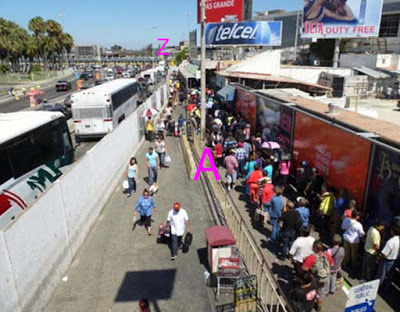 I entered the line at point A and to get home had to get to point Z I was intrigued though by the vendors who were collecting cash from gringos to seemingly lead them to the front of the line. My assumption was that they were employing the rock concert practice of hiring people to stand in line until someone came along to pay for their places. The negotiations that went on were pretty straightforward: the “coyotes” let’s call them would make a solicitation, “Rapido! Rapido!”; a wallet would come out; some alternately nodding and shaking of heads would ensue; then off they would go to where I wanted to be way up near point Z. I watched this unfold in particular with a family of four perhaps from Kansas City based on dad’s NFL head gear and then with two young women in their mid-20s. I couldn’t monitor much more because it was dawning on me that though the line was growing behind me, it was not advancing in front of me and my growing need for a trip to the baños was creating a personal crisis. I can’t tell you how many opportunities I’d passed for a bathroom stop because I was so intent on setting some kind of land-speed record for getting in and out of Tijuana on foot. But suddenly I found myself badly needing to hold my pee and badly needing to hold my place in line at the same time. After almost an hour of going absolutely nowhere, the line took a huge thrust forward. Hope rose, but it only got me to from point A in that picture to just under the covering there. Then it stopped again. I was about to go insane. As soon as I realized the young Mexican couple in front of me spoke English, I asked them what was going on…why the big rush forward and then the abrupt stop again. They explained that US border agents control the flow that way. So as not to allow a mass of teeming humanity at document control, they strictly modulate the forward movement of the crowd. My conversation with these kids yielded a whole lot more. I learned that it’s like this every day…and they should know because they have to cross the border every day for their jobs at a concert venue in San Ysidro. I learned that we probably had another hour and half in line to before getting to point Z. And I learned that the folks who paid for “Rapido” had been scammed by the coyotes who merely brought them forward and placed them in a bogus line in the sun. Sure enough, when we finally got to the entrance to the border an hour and half later the two young women and the family of Kansas City Chiefs fans were there waiting, seemingly oblivious to the fact that they had been taken. Also, most importantly, my new friends held my place while I went to the baños. It is ill-advised to draw too many broad conclusions from an anecdotal story like this, but I had plenty of time to ruminate, so here’s some of the product of that:This flow of labor and lives over the border will endure the current insanity. When I asked the kids if they faced more difficulties as Mexican workers in the US these days, they said they didn’t…that most of their co-workers were Mexican, as was their boss. Their resilience in facing this line on a daily basis also struck me as a strength that will not be worn down any time soon by a raving lunatic in the White House.At the entrance of document control itself, the guard let the kids go to the next open window first over the strenuous, vocal objection of the elderly gent with a SENTRI pass, which entitled him to preferential treatment. Since he also appeared Mexican, there didn’t seem any racial animus at work. It may have been the guard’s way of asserting some authority over a person of privilege…even if it was just brown privilege.This take was reinforced by the treatment the Mexican police gave the gringos who had paid for “Rapido” service. The kids told me the police make a point of stalling their passage because they know they’ve paid for special treatment and such bought privilege marks them for abuse far more than their Americanism does.
I entered the line at point A and to get home had to get to point Z I was intrigued though by the vendors who were collecting cash from gringos to seemingly lead them to the front of the line. My assumption was that they were employing the rock concert practice of hiring people to stand in line until someone came along to pay for their places. The negotiations that went on were pretty straightforward: the “coyotes” let’s call them would make a solicitation, “Rapido! Rapido!”; a wallet would come out; some alternately nodding and shaking of heads would ensue; then off they would go to where I wanted to be way up near point Z. I watched this unfold in particular with a family of four perhaps from Kansas City based on dad’s NFL head gear and then with two young women in their mid-20s. I couldn’t monitor much more because it was dawning on me that though the line was growing behind me, it was not advancing in front of me and my growing need for a trip to the baños was creating a personal crisis. I can’t tell you how many opportunities I’d passed for a bathroom stop because I was so intent on setting some kind of land-speed record for getting in and out of Tijuana on foot. But suddenly I found myself badly needing to hold my pee and badly needing to hold my place in line at the same time. After almost an hour of going absolutely nowhere, the line took a huge thrust forward. Hope rose, but it only got me to from point A in that picture to just under the covering there. Then it stopped again. I was about to go insane. As soon as I realized the young Mexican couple in front of me spoke English, I asked them what was going on…why the big rush forward and then the abrupt stop again. They explained that US border agents control the flow that way. So as not to allow a mass of teeming humanity at document control, they strictly modulate the forward movement of the crowd. My conversation with these kids yielded a whole lot more. I learned that it’s like this every day…and they should know because they have to cross the border every day for their jobs at a concert venue in San Ysidro. I learned that we probably had another hour and half in line to before getting to point Z. And I learned that the folks who paid for “Rapido” had been scammed by the coyotes who merely brought them forward and placed them in a bogus line in the sun. Sure enough, when we finally got to the entrance to the border an hour and half later the two young women and the family of Kansas City Chiefs fans were there waiting, seemingly oblivious to the fact that they had been taken. Also, most importantly, my new friends held my place while I went to the baños. It is ill-advised to draw too many broad conclusions from an anecdotal story like this, but I had plenty of time to ruminate, so here’s some of the product of that:This flow of labor and lives over the border will endure the current insanity. When I asked the kids if they faced more difficulties as Mexican workers in the US these days, they said they didn’t…that most of their co-workers were Mexican, as was their boss. Their resilience in facing this line on a daily basis also struck me as a strength that will not be worn down any time soon by a raving lunatic in the White House.At the entrance of document control itself, the guard let the kids go to the next open window first over the strenuous, vocal objection of the elderly gent with a SENTRI pass, which entitled him to preferential treatment. Since he also appeared Mexican, there didn’t seem any racial animus at work. It may have been the guard’s way of asserting some authority over a person of privilege…even if it was just brown privilege.This take was reinforced by the treatment the Mexican police gave the gringos who had paid for “Rapido” service. The kids told me the police make a point of stalling their passage because they know they’ve paid for special treatment and such bought privilege marks them for abuse far more than their Americanism does. I don’t know if these are observations you can take to the bank, but I did take them to the baños and it felt good.
Published on July 26, 2018 15:09
July 20, 2018
What's Priceless
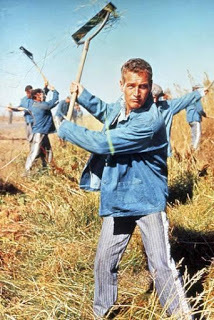 Weed whacking...the old fashioned way.
Weed whacking...the old fashioned way.As a member of a generation that has received more than its fair share of criticism, I have little use for these ubiquitous social media postings and chain emails that take such great delight in mocking or scolding “the younger generation”, whichever generation happens to be the punching bag of the day. As I’ve written before, no generation has an Executive Steering Committee that decides what direction and code of behavior every member of said generation will follow. Generations evolve in the context of their times and through interaction with the generations that went before (and sometimes after). Generations don’t brand themselves as Boomers or Millennials…branding experts do…branding experts from the older, more exploitive generation.
That being said, I must admit that this email I received from friend Michael Schaffer not only got my attention, but got me thinking. Here it is:
This is priceless!!Checking out at the store, the young cashier suggested to the much older lady that she should bring her own grocery bags, because plastic bags are not good for the environment.The woman apologized to the young girl and explained, "We didn't have this 'green thing' back in my earlier days."The young clerk responded, "That's our problem today. Your generation did not care enough to save our environment for future generations."The older lady said that she was right -- our generation didn't have the "green thing" in its day. The older lady went on to explain: Back then, we returned milk bottles, soda bottles and beer bottles to the store. The store sent them back to the plant to be washed and sterilized and refilled, so it could use the same bottles over and over. So they really were recycled. But we didn't have the "green thing" back in our day.Grocery stores bagged our groceries in brown paper bags that we reused for numerous things. Most memorable besides household garbage bags was the use of brown paper bags as book covers for our schoolbooks. This was to ensure that public property (the books provided for our use by the school) was not defaced by our scribblings. Then we were able to personalize our books on the brown paper bags. But, too bad we didn't do the "green thing" back then.We walked up stairs because we didn't have an escalator in every store and office building. We walked to the grocery store and didn't climb into a 300-horsepower machine every time we had to go two blocks. But she was right. We didn't have the "green thing" in our day.Back then we washed the baby's diapers because we didn't have the throw away kind. We dried clothes on a line, not in an energy-gobbling machine burning up 220 volts. Wind and solar power really did dry our clothes back in our early days. Kids got hand-me-down clothes from their brothers or sisters, not always brand-new clothing. But that young lady is right; we didn't have the "green thing" back in our day.Back then we had one TV, or radio, in the house -- not a TV in every room. And the TV had a small screen the size of a handkerchief (remember them?), not a screen the size of the state of Montana. In the kitchen we blended and stirred by hand because we didn't have electric machines to do everything for us. When we packaged a fragile item to send in the mail, we used wadded up old newspapers to cushion it, not Styrofoam or plastic bubble wrap. Back then, we didn't fire up an engine and burn gasoline just to cut the lawn. We used a push mower that ran on human power. We exercised by working so we didn't need to go to a health club to run on treadmills that operate on electricity. But she's right; we didn't have the "green thing" back then.We drank from a fountain when we were thirsty instead of using a cup or a plastic bottle every time we had a drink of water. We refilled writing pens with ink instead of buying a new pen, and we replaced the razor blade in a razor instead of throwing away the whole razor just because the blade got dull. But we didn't have the "green thing" back then.Back then, people took the streetcar or a bus and kids rode their bikes to school or walked instead of turning their moms into a 24-hour taxi service in the family's $45,000 SUV or van, which cost what a whole house did before the "green thing." We had one electrical outlet in a room, not an entire bank of sockets to power a dozen appliances. And we didn't need a computerized gadget to receive a signal beamed from satellites 23,000 miles out in space in order to find the nearest burger joint.But isn't it sad the current generation laments how wasteful we old folks were just because we didn't have the "green thing" back then?Please forward this on to another selfish old person who needs a lesson in conservation from a smartass young person.We don't like being old in the first place, so it doesn't take much to piss us off... Especially from a tattooed, multiple pierced smartass who can't make change without the cash register telling them how much.Of course like all such generational takedowns it’s freighted with sarcasm while being lightweight on history. Without getting too bogged down in that aspect of it, let’s just note that not all (and do excuse that politically incorrect term) kids today are tattooed, multi-pierced smartasses. Some are like the Parkland High survivors working hard every day to make this a safer country. Also, kids today did not invent the computerized cash register. That's one of the more rudimentary tools of capitalism, designed for efficiency and accountability. It is completely indifferent to whether Tupac at Taco Bell with a nose piercing and “Bitch” tattoo knows his multiplication tables. Still there’s a wealth of societal insight in this “green thing” rant. The first is that generations sometimes end up doing the right thing in spite of themselves. True, there was no green consciousness back in the day, but a lot of the good behaviors recounted in this fulmination were because there was no choice. You used a push lawnmower because either power mowers didn't exist or were too expensive. Who does things manually if there’s a mechanical option? (Actually, I do…I refuse to use a motorized weed whacker and prefer to cut my weeds down Cool Hand Luke style, but that’s only because I enjoy it…and because when it really gets out of hand I can ask the gardener to do it with his weed whacker!) It’s like how we can go on and on about the moral superiority of cultures that don’t use preservatives in their food. Yet, how much of that purity of being is due to the unavailability of preservatives rather than heartier character and enlightened thinking?Then there’s this: “Wind and solar power really did dry our clothes back in our early days.” This faux nostalgia for drying clothes on the line is really just a shot at fancy-schmancy solar energy. Like, who wants solar panels when all you really need is a rope strung between two trees, a washtub and a fireplace for cooking…and candles. Don’t forget the candles…screw you, LED.I guess the most important thing that comes through for me in this is how “progress” often takes place beneath the surface…out of the headlines and off cable news. This was the theme of How We Got to Now, the truly great PBS show previously featured in The Nob. Disposable diapers, aluminum cans, Styrofoam…these were all things developed behind the scenes in various garages and laboratories without any public debate as to whether they would be ultimately good for us. It’s really one of the benefits of life in the United States…we place a high value on inventiveness and entrepreneurship. If someone sees a way to make both a profit personally and improve life generally, the system is designed to encourage it.60 Minutes recently did a segment on one such entrepreneur. He’s Bren Smith, a former fisherman who’s transitioned to farming seaweed. It’s a commercial enterprise aimed at producing mass quantities of edible seaweed as well as greatly enhancing mussel and oyster production as a by-product. Smith is leasing expanses of water from the State of Connecticut for his growing network of water-based farms. As a consequence, Connecticut, which has recently experienced a serious drain of businesses moving out of the state, may be on the cusp of an entirely new and unforeseen industry. It may be too early to tell, but this story echoes what we see happen over and over again in How We Got to Now. Someone with real vision and ambition can end up having far greater impact on the future than, say, an egomaniac with a ‘gold thing” who struts and clucks all over the airwaves every hour of every day. That’s what’s really priceless.
Published on July 20, 2018 11:23
July 13, 2018
1968
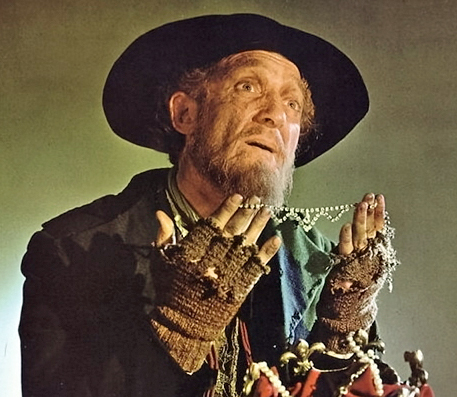 A bit of an irony--Ron Moody portrays Fagin, one of the greatest thieves in Western literature,
A bit of an irony--Ron Moody portrays Fagin, one of the greatest thieves in Western literature,and then gets robbed of the Best Actor Award in one of the greatest thefts in Oscar history
1968 was a big year in my personal life, and as Netflix just reminded me in an email promo, it was a big year in American culture. 1939 is by most measurements the best year in movie history, but 1968 produced more than its share of great movies as a look at the top grossing films of the year in the chart below will attest:
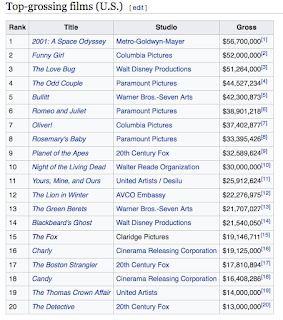
Not only are there a number of truly brilliant films there, but what’s even more amazing is the diversity of the list and the fact that there was a large audience for such a wide spectrum of films. I look at today’s offerings at our local Cineplex and for all the available screens there is a depressing sameness and lameness about what’s playing…two FBI agent redemption thrillers; the obligatory Marvel Comic cum movie; two special-effects extravaganzas; two kid-friendly animation features; a female friendly reboot of a franchise; a noisy advertisement for an upcoming Universal Studios attraction posing as a movie; and Sorry to Bother You, a film quickly on its way to rental but playing in theaters just long enough to serve as the punchline for this year's Hollywood product. I won’t belabor the “they don’t make them like they used to”point, but there are a few films I want to call out on the 1968 list:
Lion in Winter—Hooo-EE…Hepburn and O’Toole, easily one of the half-dozen great male-female sparring matches in movie history…the fact that 4 of the other 5 also star Kate is a testament to how she could lift any man’s game.
Bullitt—watching as many old classic films as I do with car chases often consisting of actors just sitting in stationary car seats while fast moving scenery flew by on a background screen, it’s easy to see how Bullitt’s mad Mustang dash over the streets of San Francisco was such a sensational raising of the bar. It practically elevated the car chase to an art form, often imitated, but rarely duplicated. With today’s CGI car chases, it’s often a good time to take a bathroom break…and bring along a book, but Bullitt continues to hold you in your seat.Planet of the Apes—Saw this one at a midweek matinee…and like my first James Bond experience, as second billed on a double feature with Tony Randall in Fluffy…it turned out to be one of the all time best surprises of my movie going life. No matter how bloated and repetitive, either the Apes or Bond films became over subsequent decades, the thrill I felt at first watching has carried me through. (As a footnote, Charlton Heston and Kim Hunter represented the opposite ends of the Hollywood political spectrum…which merely serves to underscore that for all the intense, violent politics of 1968, the films of that year were largely devoid of those politics, though films of subsequent years would not be.) Rosemary’s Baby—The haunting here now is less about the brilliant, patient layering of horror that went into making it, but what to do about the creative genius responsible for making it. Roman Polanski heads a growing list of creative forces whose personal behavior argues against their professional achievements. I haven’t seen Rosemary’s Baby in a long time, certainly not since Polanski skipped the country to avoid the consequences of having sex with an underage girl, but my guess is that art, as always, will triumph. Oliver!—I’m a sucker for musicals, and this is one of my favorites. The fact that Ron Moody lost out to Cliff Robertson in Charly for best actor Oscar remains one of the greatest injustices in award history--and the more I think on it, I probably decided to blog about the films of 1968 just to emphatically make that point!!!!The Green Berets—Oh, did I say the films of 1968 were devoid of the politics of the time? What a piece of dreck. The Odd Couple—Second Tony Randall mention here…and what a subtle comic genius he was. There’s noting more dispiriting than to go back to a beloved funny movie and watch it fall flat before your aging eyes. But as I sit here writing, I have a smile on my face just thinking of the card game and the spaghetti on the walls. I’m going to put it in my queue and dare it to disappoint me. The Thomas Crown Affair---loved it when it came out…but must admit I actually love the remake with Pierce Brosnan and utterly delicious Renee Russo much more, thanks largely to the closing museum chase to the scintillating sound of Nina Simone doing Sinnerman . Still, Steve McQueen starring in two terrific and immensely popular films in one year. That hardly happens any more. It's hardly even attempted. 2001: A Space Odyssey—Need I say more? Can I say more? Simply put, any movie season that produced this masterpiece would have been great.
Published on July 13, 2018 14:49
July 4, 2018
Americans in the Myth
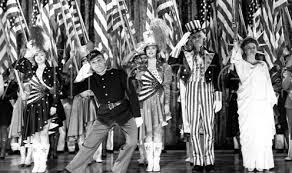 The Yankee Doodle DandyBefore our movies got all real and cynical and ironic, they were idealistic and aspirational..often filled with what was derisively called Capra corn. They were less reality based than mythical...mythic meaning envisioning ourselves at our best. In acknowledgement of this most inauspicious Independence Day, here's a small selection of dialogs from old movies that captured what we thought of ourselves...not exactly who we were, but who we wanted to be...
The Yankee Doodle DandyBefore our movies got all real and cynical and ironic, they were idealistic and aspirational..often filled with what was derisively called Capra corn. They were less reality based than mythical...mythic meaning envisioning ourselves at our best. In acknowledgement of this most inauspicious Independence Day, here's a small selection of dialogs from old movies that captured what we thought of ourselves...not exactly who we were, but who we wanted to be...No, we don’t make movies like that anymore...and we’re a lesser country because of it. We’ve lost our rosebud, and so its a sadder birthday than ever was.
Published on July 04, 2018 09:15
June 29, 2018
It's Beyond Me
 What the metaphor tells us is that beauty always comes mixed with sharp pain
What the metaphor tells us is that beauty always comes mixed with sharp painBecause I believe in always having a Plan B when the world as we know it came to an end on the night of November 9, 2016, I was prepared. I would simply turn off the news until the Plague of the Sleaze had passed. It seemed relatively easy to institute a self-imposed quarantine since I spend about 90% of my time in splendid isolation. The TV and Internet were the only possible ways for the sickness to seep in, and for the first few months following the debacle of the 2016 Presidential Election I did a pretty good job at keeping the bad news at bay. But then an almost inescapable combination of factors caused me to engage in high risk behaviors that ended up pushing me out on the streets in protest (another one tomorrow); writing and reading almost nonstop about the wretched state of the nation; and turning on my computer each day with mounting, unrelenting dread. And so it was that this week, I joined so many others in reaching a state of peak despair. In this state I ask myself how would my condition differ if I had succeeded in protecting myself from the seepage…if I had truly blocked out every national political development of the past 19 months? Here’s an assessment:We would still be living happily in this exquisite place we call homeWe would still be living well enough off the money we’d put away for retirementWe would still be celebrating our 50th wedding anniversary this September in ItalyWe would still be enjoying the electric bikes we bought for Lorna’s 70th birthdayWe would still be reveling in pictures, texts, and visits with our kids and their kidsWe would still have both our health and our healthcareWe would still have a wide circle of friends for camaraderie
That last item right there is the pivot point because although all the other items on the list would be the same with or without The Sleaze, the circle of friends would not. It is definitely not as wide or comforting as it was before The Sleaze. The Sleaze has become a litmus test for friendships because there is no way to share good times and mutual affection with people who condone what’s going on…who cannot get beyond themselves to see the far-reaching harm that is being done to our country. That’s what it comes down to when I reflect on the issues that have aroused my words and actions these past many months…the ability to get beyond me. I’m not black. I’m not a woman. I’m not an immigrant. And if I could just shut out what’s happening to them , I could continue along in my merry bliss, untouched personally by The Sleaze. So what is the mental calculation or emotional process that forces me to disturb my tranquility by assuming--at least collaterally--the burdens of others? The question leads me to contemplate what degrees of attachment did it take for people to forsake their own comfort during other national crises. In recent history we’ve heard many stories of people who watched the Twin Towers come down on 9/11 and immediately went out to enlist…some giving up far more than others and paying a far greater price. One wonders what the emotional hook was in a time before mass media. What, for instance, drove enlistment during the nation’s two most dire periods…the Civil War and World War II? Ideally we would like to think that millions gave up their private lives to free blacks from slavery or save Jews from Hitler’s ovens, but realistically that is primarily grist for Hollywood's myth-making factory. That leaves the field open for the cynical explanation that those people had no choice in the matter because of the draft. But available statistics belie that. Only 2% of the Union Army consisted of conscripts, and after France fell to Germany US polls showed that Americans overwhelming supported re-instituting the draft. Without benefit of being a war historian, I’m going to guess that the real motivating factor in both those wars was the fact that the country had been attacked…first at Ft. Sumter and then at Pearl Harbor. An enemy attack in fact seems such a sure bet for avenging “the patriotic gore” that a false one, such as the Gulf of Tonkin*, can do the trick.
The despot's heel is on thy shore, Maryland!His torch is at thy temple door,Maryland!Avenge the patriotic gore
I engage in war talk here because I believe it provides the most extreme example of people sacrificing their lives--if not exactly for others--for something beyond themselves. It’s scarily relevant to the current situation because we’re probably closer to civil war now than we’ve been since the mid 19th century…and we have to ask ourselves how we feel about that prospect. If I inventory each of the current pressing issues individually:Rising authoritarianismElectoral fraudCodified nativismRampant government dysfunction and corruptionEpidemic gun violencePersistent, systemic racism and misogyny
...None on its own rises to the level of casus belli, but taken cumulatively they really do demand a citizen uprising that may require more than marches in the streets…more than yelling fuck live on TV from the Tony awards…more than chasing a gluttonous propagandist out of a restaurant. These things are mere prelude to what’s likely to come…or not. Perhaps, unlike the 1850s or the 1940s, more Americans than not will decide it’s not worth the sacrifice to fight for what’s important. More Americans than not will push aside the most persistent lesson of history—that appeasing brutes and bullies never works. More Americans than not will choose to be “Good Germans”—believing that as long as they’re not the ones physically pulling families apart; brutalizing minorities; robbing from the public till; lying on the public record; shooting up schools, churches and movie theaters then none of it has anything to do with them…that their hands are clean…that their security gates and skin color and ethnicity will allow them to continue living in their own private and privileged America. No doubt that’s a gamble that many will take in the months to come. But history has shown over and over again that if you fail to get beyond me only two destinies await you: regret or shame.
* According to John Prados of the independent National Security Archive, Hanyok asserted that faulty signals intelligence became "vital evidence of a second attack and [Johnson and McNamara] used this claim to support retaliatory air strikes and to buttress the administration's request for a Congressional resolution that would give the White House freedom of action in Vietnam."
Published on June 29, 2018 17:50
June 22, 2018
All Bully; No Pulpit
 Apocalypse now.
Apocalypse now. It was President Teddy Roosevelt who coined the phrase "Bully Pulpit" to describe the Oval Office as a powerful platform for launching important messages to the nation. At the time the word bully, one of Roosevelt’s favorite buzzwords, did not quite have the meaning it has today. When TR said, “Bully…bully” he meant outstanding. And of course his use of pulpit wasn’t strictly denotative because he didn’t mean messages of a religious nature. Like so much else in the Trump Era, Bully Pulpit has pretty much been turned on its head. Any claim that messages emanating from the current occupant of the Oval Office “pulpit” have anything to do with morality, virtue, honor, decency or any of the other ethical concerns of theology is just perverse:

It’s not that we’ve never heard such rank hypocrisy spew forth from a pulpit before, but it seems particularly galling coming from a gold-plated phony who’s made multiple, spectacularly public “mistakes” in his failed marriages, businesses, and legal entanglements. If not exactly sympathy and compassion, he continues to be the recipient of an endless flow of indulgence from his para-religious base, so in that sick sense one could concede that the Trump Oval Office is still a bit pulpity.As to the bully part of TR’s formulation, this is where things really get twisted. Trump is fully invested in the contemporary meaning of the word, as in “a person who uses strength or power to harm or intimidate those who are weaker.” This is manifest in the way he constantly uses schoolyard taunts while safely surrounded by armed security and thousands of supporters, like this one from his recent rally in Duluth:
"Goodbye, darling," Trump said as law enforcement escorted the person out of the arena. "We have a single protester. He's going home to his mom. Say 'hi' to Mommy. Was that a man or a woman, because he needs a haircut more than I do. I couldn't tell.”It’s manifest in his simpatico for other bullies in the world, such as Putin (“has great control over his country”), Kim Jong-un (“the strong head of the country”) Duterte ("doing a great job").And then of course his bullying is manifest in his policies, none more thuggish than his recent attempt to intimidate refugees the world over by separating the families of recent arrivals at America’s borders who were seeking asylum from oppressive conditions elsewhere. Another hallmark of the bully is how they react when someone stands up to them, and in that regard Trump was win full display as the classic bully he is this week. He denied doing what he was caught doing. Then he whined that it wasn’t his fault. And then he pointed fingers at others and asked why no one was picking on them. And finally--with his gang of bully worshippers in Duluth cheering him on--he started talking tough again. It was like a week of having a reality cam pointed at a 14-year old who steals lunch money from grade schoolers.It is a tenet of The Nob that people generally hate politics…and not without reason…and not without dire consequences. So as much as the word fascism gets thrown around these days, I suspect that most people really don’t have a firm grasp of what fascism is. To help remediate this gap in civic education, here's as clear and elementary a definition as you can ask for: Fascism is what happens when a bully--without compassion or other empathetic virtues-- takes over your country.
Published on June 22, 2018 10:10
June 16, 2018
Are You Talkin' to Me?
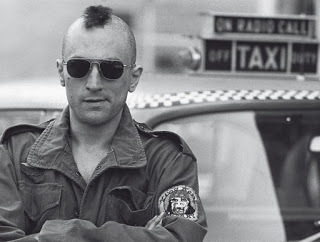 DeNiro as Travis BickellTaxi Driver is one of those films so dominated by one iconic scene that the scene obscures the greater, more complicated message of the film itself. It is not a paean to the lone psychotic killers that so infest our culture. It is about the historically vexing and metaphysically troubling question of how does an aspiring moral society judge bad acts that achieve good ends. In Taxi Driver, loner Travis Bickell has been smitten by a woman who works for a politician and becomes bent on assassinating the politician out of jealousy and resentment cloaked as social outrage. He’s foiled in his assassination attempt, but does succeed in killing a pimp and two thugs who are exploiting a 12-year old prostitute. The media knows only of the “good” killings and not of the “bad” attempted one, and as a result Travis is portrayed as a hero. I imagine that Robert DeNiro was channeling his Travis Bickell character a lot this week, standing in front of his TV, his newspaper, his Twitter feed and saying over and over again, “You talkin’ to me? You talkin’ to me? Are you talkin’ to me?” as the Hall Monitors of the national discourse took him to task for declaring “Fuck Trump” live and on stage at the Tony Awards. From the Washington Post:
DeNiro as Travis BickellTaxi Driver is one of those films so dominated by one iconic scene that the scene obscures the greater, more complicated message of the film itself. It is not a paean to the lone psychotic killers that so infest our culture. It is about the historically vexing and metaphysically troubling question of how does an aspiring moral society judge bad acts that achieve good ends. In Taxi Driver, loner Travis Bickell has been smitten by a woman who works for a politician and becomes bent on assassinating the politician out of jealousy and resentment cloaked as social outrage. He’s foiled in his assassination attempt, but does succeed in killing a pimp and two thugs who are exploiting a 12-year old prostitute. The media knows only of the “good” killings and not of the “bad” attempted one, and as a result Travis is portrayed as a hero. I imagine that Robert DeNiro was channeling his Travis Bickell character a lot this week, standing in front of his TV, his newspaper, his Twitter feed and saying over and over again, “You talkin’ to me? You talkin’ to me? Are you talkin’ to me?” as the Hall Monitors of the national discourse took him to task for declaring “Fuck Trump” live and on stage at the Tony Awards. From the Washington Post:But there are words, and then there is the actual “job” — that of improving the administration, seeking to change it or attending directly to the needs of those affected by its policies. The one can influence the other. Language changes how we think. When we use increasingly divisive and polarized language in the public square, we change how we are able to interact, discuss and exist together. The F-bombs and c-words are a distraction from the actual work that could be done and cut off possibilities for cooperation in the future.DeNiro, like many of us, must be in full throttle WTF mode at how resistant the keepers of public decorum are to the realization that we are far past the Rodney King's dream of social debate. Rodney’s plea of “Can’t we all get along?” has been answered pretty definitively over the past two decades, “No, we can’t.” There are myriad reasons for this, but it’s not unreasonable to cite Newt Gingrich as the Patient Zero of the virus that has infected our national politics and spread to epidemic proportions.
In 1979, newly elected Congressman Newt Gingrich came to Washington with a blunter, more cutthroat vision of politics than Republicans were accustomed to. Backed by a small but growing group of loyalists, Gingrich launched an insurgency aimed at instilling a more “combative” approach in the party. Taking advantage of a new media technology, C-SPAN, Gingrich used hateful language, deliberately employing over-the-top rhetoric. He described Democrats in Congress as corrupt and sick. He questioned his Democratic rivals’ patriotism. He even compared them to Mussolini and accused them of trying to destroy the country…Though few realized it at the time, Gingrich and his allies were on the cusp of a new wave of polarization rooted in growing public discontent, particularly among the Republican base. Gingrich didn’t create this polarization, but he was one of the first Republicans to sense—and exploit—the shift in popular sentiment. And his leadership helped to establish “politics as warfare” as the GOP’s dominant strategy.So, we’re really not talking about discourse…civil or not…we’re talking about warfare and have been for quite some time, though the editorial boards of the Washington Post and New York Times still think they can restore civility with carefully balanced editorial pages, which are nothing more than pedantic, predictable, pusillanimous pundit variations of he said/she said. It’s war…but as the Pentagon might describe it, it’s asymmetrical war. One side gets to use any means necessary, while the other side is held to Marquis de Queensbury Rules. When the right erupts in outrageous, violent expressions of political dissent…as it effectively did during the post-Obamacare town halls where supporters of the health care reform were almost uniformly shouted down, it was usually framed as an outcry from a long-silent oppressed majority seeking voice against an indifferent government. Even the stupidity of one of the protestors shouting, “Keep the government’s hands off my Medicare!” only added to the image of the poor, befuddled Every Man and Woman rather than exposing the rank hypocrisy of the entire movement. Only the drama mattered…the snarling, angry faces of a citizen army on the march...a mythical Tea Party uprising. Whether they march with tiki torches against better police treatment of black citizens or with guns against control of assault weapons, they are always afforded the benefit of the doubt…there are always sympathetic ears for their pathologies in the editorial boards and halls of Congress. Not so much for liberal outrage. Liberal outrage is always held to a higher standard...burdened with the obligation to tone it down, offer solutions, willingness to meet the other side half way. Here’s the deal…none of that has worked, and any day now it is all going to become utterly moot if not pathetic. Any day now the wannabe authoritarian in the White House may shut down the investigation into his criminal activities, may issue pardons to those who aided and abetted him, may further collude with enemy states that prop him up for their own aggrandizement…and on that day millions will be required by citizenship and patriotism to take to the streets and march against him and his subversion of our democracy. And when that day comes and they do, they may very well all be chanting “Fuck Trump” because contrary to the views of the Hall Monitors what Robert DeNiro voiced at the Tony’s was not a New York Times editorial or a Brookings Institute policy paper, it was a fucking battle cry. Get used to it. The Scene
Published on June 16, 2018 11:05
June 8, 2018
Parts Unknown
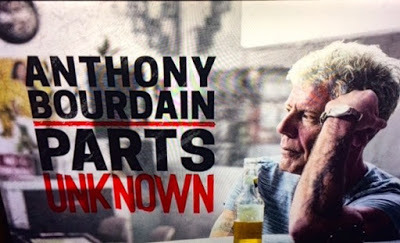
I’ve learned to take a deep breath before opening my daily news summary each morning. Always glad I did. But this morning even that reserve breath was blown away by news that Anthony Bourdain had committed suicide. My shock was similar to what I felt on the day I heard of Robin Williams’s suicide. It wasn’t that either man didn’t allow his personal demons to be on public view—always--but that both were so genius and impassioned about their respective pursuits in life that one wanted to believe that it would be enough to pull them through their darkest hours.
I’ve been an avid fan of Anthony’s show Parts Unknown on CNN since its inception. At first the double meaning of the title clearly leaned on the parts unknown of the animals, fish, and other growing things that Anthony would cheerfully, often daringly, ingest in his travels through remote corners of the world. That was a big part of my early fascination. Though not the finicky eater I once was, I’m still very particular about what I put in my mouth. And I’m a little ashamed to admit that I’ve never been one to put courtesy over my distaste for or aversion to eating certain things. My youthful ambition to be a politician was probably killed as much by the fear of having to eat corn dogs to win the Iowa primary as anything else. (John Kerry refusing to have Cheez Whiz on his Philly Cheesesteak? I’m with you, man. Forget Pennsylvania’s 20 electoral votes.)
But Anthony never turned his nose up (on camera anyway) at any food presented to him by any of his hosts from around the world. And it’s clear after watching him for years that it was that show of good sportsmanship that created the bond he had with so many of the diverse people his camera crew invaded.
In recent years, however, he began to emphasize more heavily the other meaning of unknown parts…the various subcultures of our world as they have been formed by geography, arts, music, literature, politics, and human aspirations. In the past two years, Anthony seemed to be on a fervent mission to show us in each hour episode how interwoven we are through our diversity, not in spite of it. The exotic food became less an end in itself for the show and more of a medium through which Anthony explored cultures with intelligent, articulate people who were often both passionate advocates for their cultures and dispassionate observers of them. In a recent show over a meal of sheep’s head with three young professional women in Armenia he asked about the prospects for the better future of Armenia they were all working toward. One of them answers, “History is not a stable thing we can depend upon.” It was typical of the unscripted insights Anthony was able to elicit again and again from strangers he met in his travels or old acquaintances he’d renewed.
Some of the episodes were so personally enlightening for me that I saved them in my dvr queue for repeated viewings…and I highly recommend them here for anyone who missed them:
Houston —I admit to holding most of the biases against Texas typical of one of my background…too much guns, god, and greed. But Anthony’s show on Houston was a real eye-opener, revealing a rich, diverse culture made up of Mexican, Asian, and African influences…and a broad, colorful swath of “minority” people actually taking pride in being Texan.
Montana —The cruel irony of the “Big Sky Country” is that the earth below was turned into the most toxic on earth in the frenzy to extract natural resources. As he did in most of his shows, but especially recently, Anthony explored how things got to now…how the corporations with the complicity of job hungry unions allowed their environment to be pillaged and polluted. And he talks with…not down to…the survivors of this environmental rape about the crueler irony of having to turn to government taxes and regulation to clean up their country.
Singapore —It is the showcase for globalization, bursting with tall, glistening buildings, headquarters for giant global corporations all drawn to its shores by indulgent government tax and regulatory policies. And in the shadows of the skyscrapers, a bright, industrious population voluntarily surrenders individual freedoms for the promise of lifetime jobs and housing.
Vietnam —This was probably Anthony’s masterpiece…featuring deep, revealing conversations with participants on both sides of the war, topped off with an enjoyably thoughtful conversation with Barack Obama in a Hanoi restaurant.
There were some misses along the way. Most disappointing for me, an avowed Italophile, were his episodes on Sicily and Southern Italy. In Sicily, some local vendor tried to con him by planting the shell fish they were supposed to dive for together, and it visibly pissed Anthony off for the rest of the visit. And on the mainland in Southern Italy he seemed to turn it over to the new love of his life, Italian director Asia Argento, and it ended up being far more style than substance.
Anthony’s self-admitted and self-evident vices and/or weaknesses actually made the show more compelling, albeit uncomfortably so sometimes. His journey from his roots as a chef in Provincetown to the roots of his drug addiction in Western Massachusetts may be one of the best, least sensational TV productions on the insidious nature of opioids and heroin. Then there was the excruciating episode with his oft-time traveling companion Eric Ripert. It’s clear the two men are fond of each other, but in their visit to Sichuan province in China Bourdain took unseemly delight in taunting and humiliating his good-natured friend. That seemed a stark demonstration of the “bro culture” Anthony admitted to promoting in his biography Kitchen Confidential. After viewing one show, I said to Lorna, "I like my Anthony on TV. I think he might be a little too much as a personal friend." I may have been wrong about that.Bourdain was open and unsparing in his self-assessments, which made his voice so unique in our popular culture. There was nothing whiny or exculpatory when he took ownership of his errors. His recent confessions to the #MeToo movement are typical.
I had to ask myself, particularly given some things that I’m hearing, and the people I’m hearing them about: Why was I not the sort of person, or why was I not seen as the sort of person, that these women could feel comfortable confiding in? I see this as a personal failing. I’ve been hearing a lot of really bad shit, frankly, and in many cases it’s like, wow, I’ve known some of these women and I’ve known women who’ve had stories like this for years and they’ve said nothing to me. What is wrong with me? What have I, how have I presented myself in such a way as to not give confidence, or why was I not the sort of person people would see as a natural ally here? So I started looking at that.I’m going to miss that voice. And if there was one person I wish could take a camera crew to the greatest part unknown of them all…death…Antony Bourdain would be that person.
Published on June 08, 2018 10:13
May 31, 2018
Maggie's Song

Maggie Haberman, the chief White House reporter for the New York Times, just spent a Memorial Day weekend I suspect she’ll never forget. She was under round the clock Twitter attack for her stubborn refusal to use the word lies to describe much of what comes out of Donald Trump’s mouth, which are certifiably lies. As I’ve written before, The New York Times seems to have carved out a niche for itself as the Miss Manners of national discourse, and Maggie’s dogged reliance on such euphemisms for lies as “misleading” and “controversial” could be nothing other her attempt to abide by the employee handbook. Yet, in her defense this past weekend she ventured beyond that and ended up down a metaphysical rabbit hole where a lie is not a lie if the teller of the lie believes it to be the truth. Pull up a chair, Mad Hatter.
That is an automatic Get Out of Jail Free card for a whole range of crimes against society from shoplifting to murder. “I thought those were free shoes, your honor.” “I thought she was trying to kill me.”
The Nob has dedicated quite a lot of time and space to the subject of lying….here…here…and here, for instance. I’m fascinated by deceit as such a natural and essential part of our survival…and our almost universal abhorrence of it. Accusing someone outright of being a liar is pretty much what most of us recognize as “fighting words”. And it’s not hard to understand how a proud, august publication like the New York Times would look upon using such a coarse, inflammatory word as beneath it. I wouldn’t be surprised if the Times considered referring to it as the L-word in its stylebook until someone pointed out it might be confused with “lesbian”. Thus a Times headline could be interpreted as accusing Trump of committing 3,000 lesbians since he’s been in office.
Anyway, I’m willing to cut Maggie Haberman some slack on this bit of semantic daintiness because she very often delivers the goods when it comes to substantive reporting on Trump’s criminality and venality no matter how she much she tries to cushion it in nuance, euphemisms and equivocation. Nonetheless, watching her duck and weave all weekend inspired me to pen this ditty for her…
Maggie’s Song(with apologies to Don Henley and Glenn Frey
Times girls just seem to find out early
How to open doors with just a smileA rich old man
And she won't have to work hard
She'll dress all up in smarts and go beguileLate at night the big White House gets lonely
I guess every form of plunder has its priceAnd it breaks her heart to think her job is onlyTo cover a fraud with hands as small as mice
She tells him she must go back for some fact checkin’
To view familiar news bites of his sound But he knows where she's goin' as she's textin'She is headed for the fake news side of town
He can't hide his lyin' lies
And his smirk is a thin disguiseWe thought by now she'd realizeThere ain't no way to hide his lyin’ lies
On the lefty side of town Resist is waiting
With fiery hearts and dreams no one could stealShe drives on through the night in agitation'Cause it makes her feel the way she should not feel
She rushes from lib arms; they fall so apart
She maintains that it's not her role to judgeShe swears she knows not what’s in his blackened heartShe looks away and doesn’t even budge
He can't hide his lyin' lies
And his smirk is a thin disguiseWe thought by now she’d realizeThere ain't no way to hide his lyin' lies
She gets up and pours herself a strong one,
And stares out at the stars up in the sky.Another night, it's gonna be a long one.She reads her tweets and hangs her head to cry.
She wonders how it ever got this crazy.
She thinks about dreams she had in j-school.Did she get tired or did she just get lazy?She's so far gone she feels just like a tool.
My oh my, he sure knows how to obscure things.
He sets it up so goddamn recklessly.Ain't it funny how euphemisms can not change things?He’s still the lying liar he used to be.
He can't hide his lyin' lies
And his smirk is a thin disguiseWe thought by now she'd realizeThere ain't no way to hide his lyin' liesThere ain't no way to hide his lyin' liesMaggie, you can't hide his lyin' lies
Published on May 31, 2018 11:22
May 25, 2018
Reality Based Faith
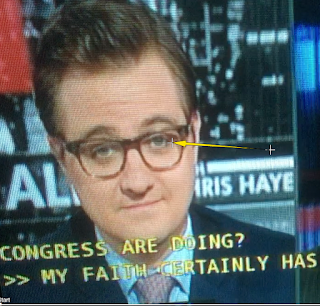 The face of little faith
The face of little faithThe word faith is generally associated with the religious realm…people of faith; faith-based communities; oh, ye of little faith, etc. If it’s used in more profane precincts, it’s usually sports where fans are always being aroused to keep the faith. In politics faith appears almost entirely on one side of the partisan divide…Republicans, especially the dominant evangelical Republicans, freely frame their beliefs and actions as matters of faith. Democrats? Not so much. That’s why the brief exchange in the video below between MSNBC’s Chris Hayes and Democratic Senator Richard Blumenthal of Connecticut is so remarkable. In it Hayes introduces the word faith pretty clearly to contrast his own skepticism about the safety of the Robert Mueller investigation into Trump high crimes and misdemeanors with Blumenthal’s view. When Blumenthal embraces the word faith, it sounds as if Hayes is scoffing at him off camera…and when they’re on camera together it appears that Hayes is eye-rolling him. The dynamic between the two men in this very secular conversation is not unlike the dynamic that goes on in religious debates between believers and nonbelievers. Believers generally welcome faith in word and meaning into the debate, while non-believers disdain it on all levels. In this dialog between Hayes and Blumenthal in both tone and facial expression, Hayes can hardly conceal his incredulousness at Blumenthal’s faith, taking it as a priori proof of Blumenthal’s naiveté.But let’s step back for a moment. Hayes has not asked Blumenthal if he believes in God or angels or heaven or any of the other fantastical notions that make up and pass for so much religious debate. He has asked him if he has faith in the institutions…the courts, congress, law-enforcement…established to protect the nation from an authoritarian take over. These are real, substantial entities…not mythological fancies…with the capacity to both fail or succeed based on human will and intention. We're talking about reality based faith here. Expressing faith in these institutions should not be dismissed as mere naiveté. Having such faith, it seems, is fundamental to being a citizen, otherwise why bother? Why follow the Mueller investigation? Why invest so much in it emotionally and politically? Why march in protest against the growing authoritarianism? Why support politicians and news outlets fighting the corruption each and every day? Why vote in November? These are all secular questions, but they have a religious resonance because to answer them positively with words and actions requires faith. Faith that all our best thoughts and efforts will lead to…if not exactly heaven…a satisfactory and better end. It is notable that Blumenthal admits that his faith has been shaken during these recent months by the torrent of lies, misdirections, and miscreant behavior of many of those charged with protecting the nation from this great undoing. The test of faith is as old as the story of Job. Truly religious people accept that hardships along the way are tests of their faith. And by truly religious people I don’t necessarily mean the white rightwing evangelicals who fuel liberal fever dreams whenever religion comes up. I mean the generations of black folks who have faced demons beyond Devin Nunes, Mitch McConnell, and even Donald Trump and have survived them through the sheer strength of their faith. Chris Hayes can scoff at Richard Blumenthal’s faith all he wants, but there’s no way he fiercely steps in front of that camera every day to expose the latest Trump outrage if he didn’t share some of that faith with him...if he didn't believe, despite evidence to the contrary, that his work was going to help this all come out right in the end.
Published on May 25, 2018 08:48



